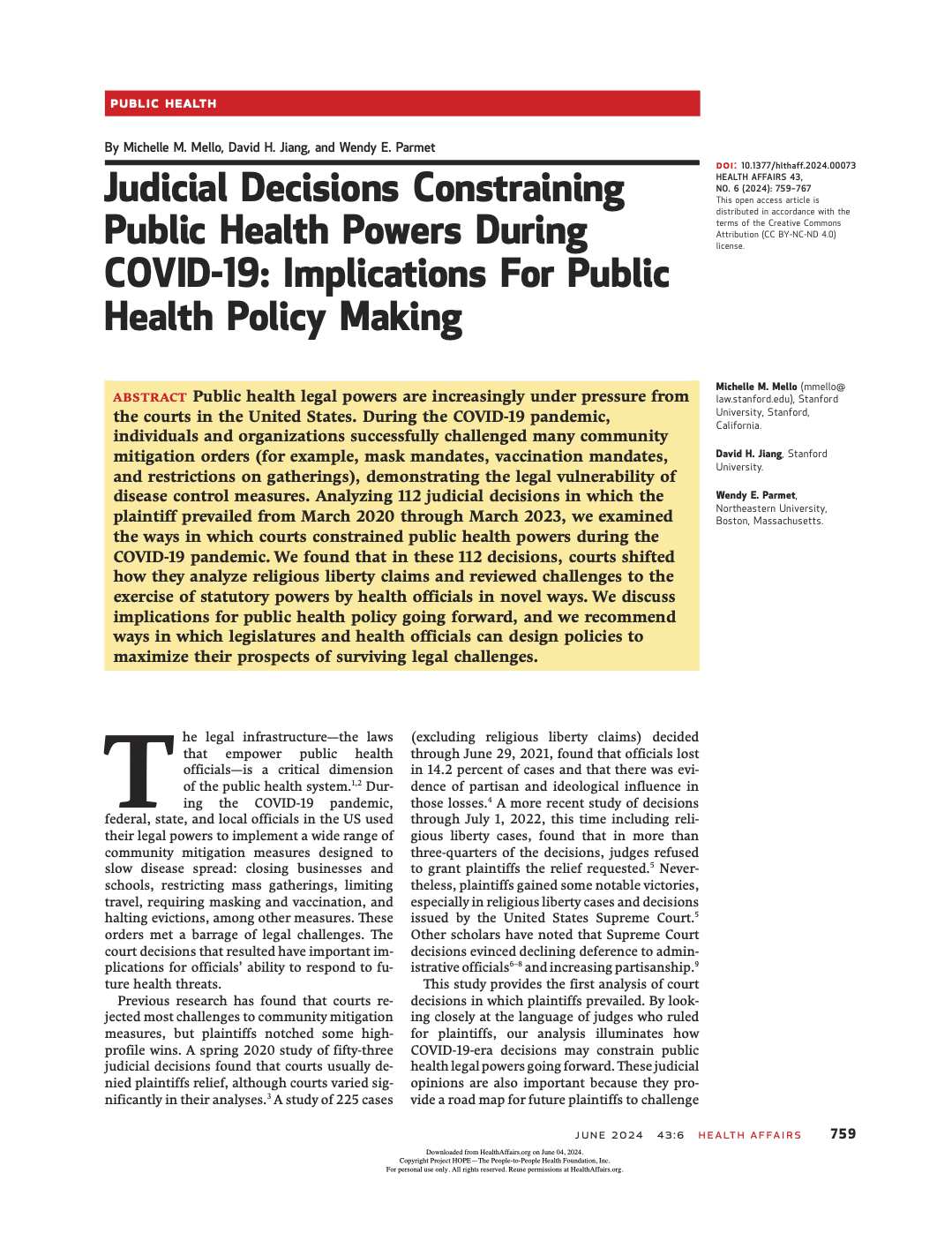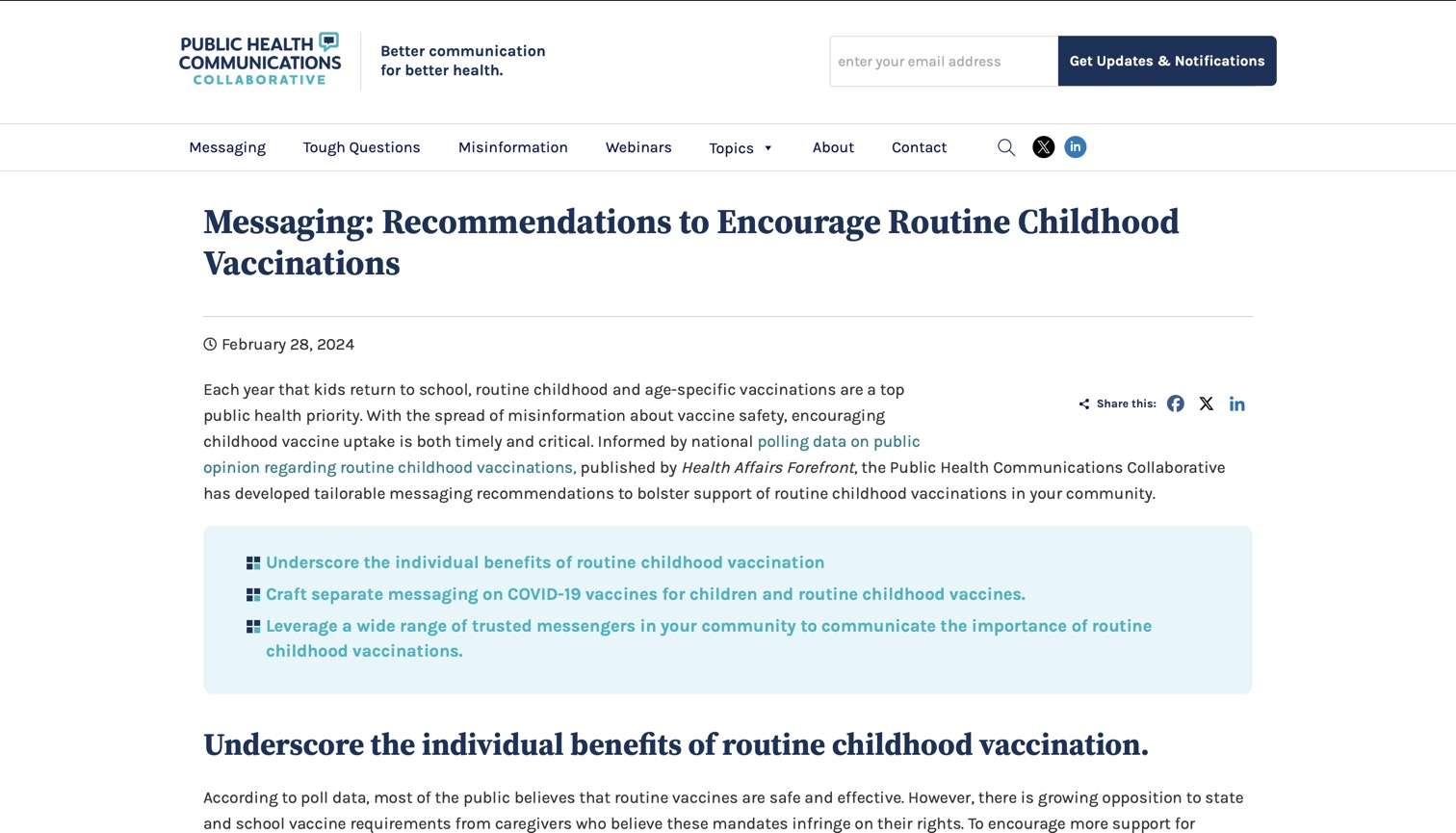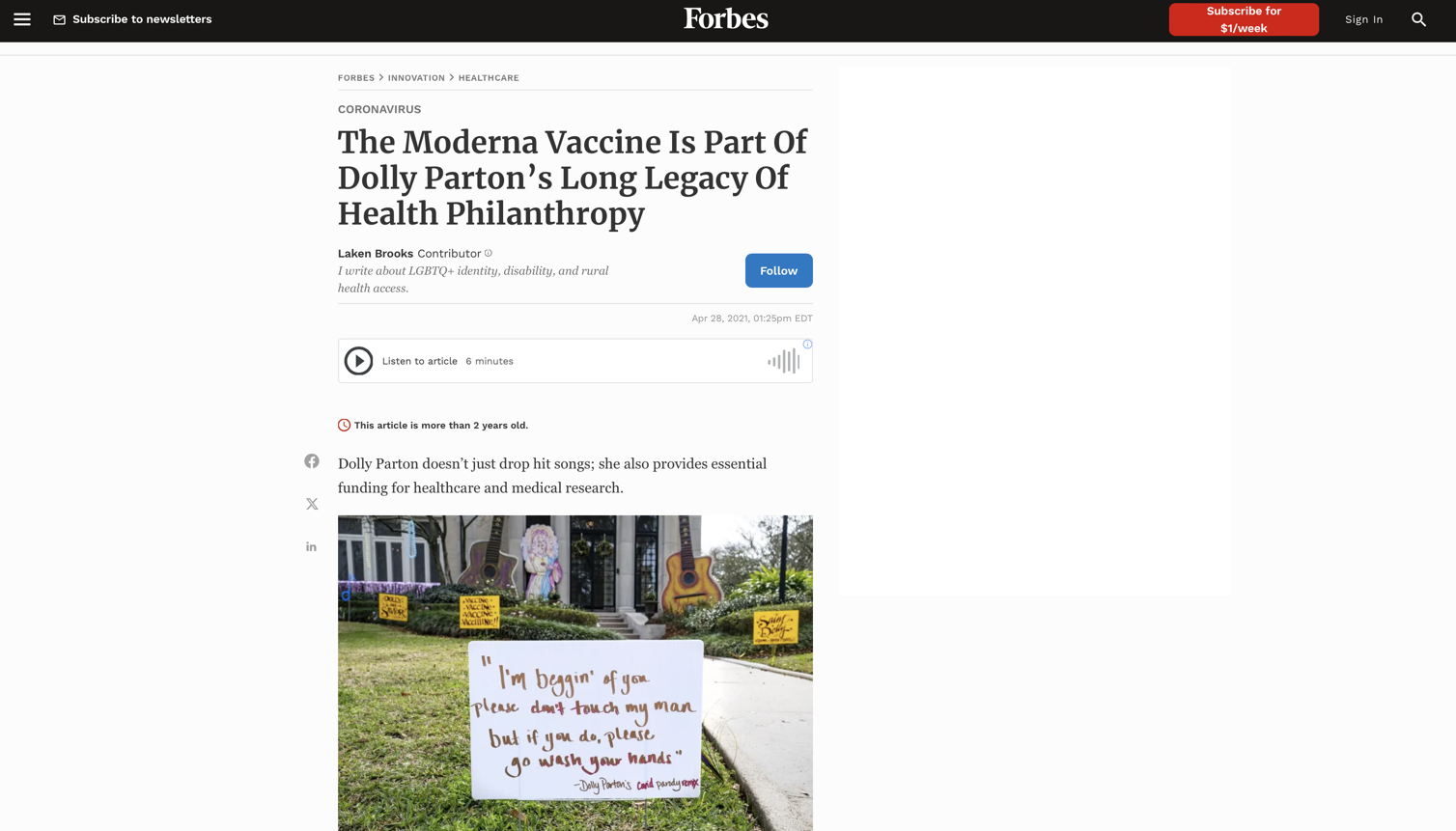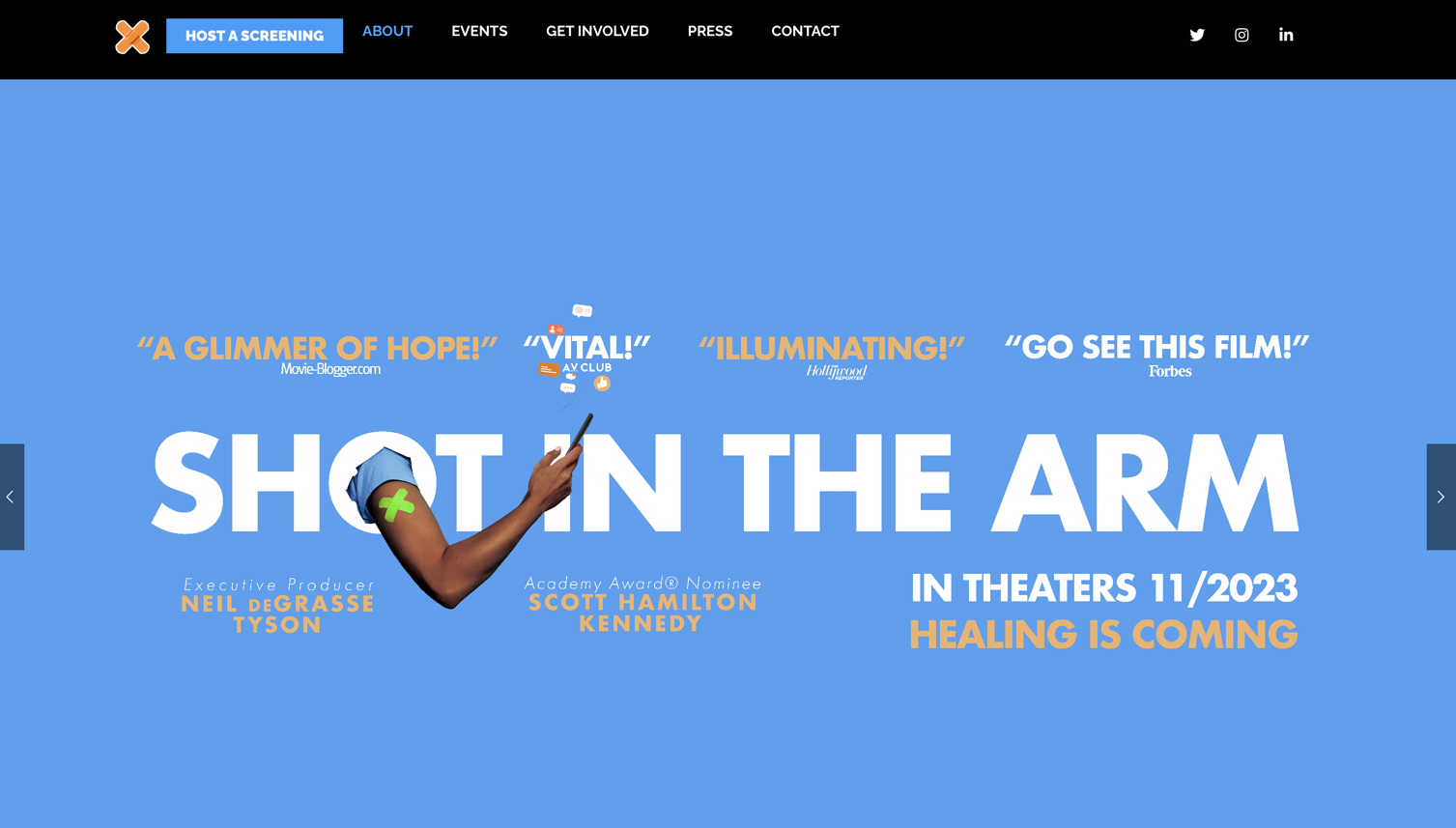
Vaccination

Vaccination is one of public health’s most successful tools for preventing and controlling the spread of infectious diseases and, increasingly, cancers and chronic diseases too. Immunization is an effective and cost-efficient strategy that prevents sickness and death in all age groups and saves billions of dollars each year. The COVID-19 epidemic and recent outbreaks of measles and other preventable infectious diseases underscore the importance of vaccines and sustaining high vaccination rates. Work is needed to ensure that people of all ages receive a complete series of the vaccines they need.
Themes
- Vaccines are safe and effective: Vaccines are highly regulated, safe, and effective. Clear, consistent and effective messaging is needed to spread this narrative and build confidence in vaccines.
- Vaccination is a public health imperative: Vaccination is our surest strategy to combat COVID-19, as well as influenza, measles, polio, meningitis, and many other deadly, vaccine-preventable diseases. Ensuring people get vaccinated and boosted against COVID-19 continues to be a public health priority. Now is the time to promote vaccination against other maladies as well, like seasonal influenza, shingles, HPV, childhood series and others.
- Increasing vaccine confidence: Misinformation about vaccines is as old as vaccines themselves. Misinformation feeds anti-vaccine sentiments which can erode public confidence and lead to reduced rates of immunization, and thus population-immunity. Increasing vaccine confidence is an antidote to misinformation. Using trusted messengers to deliver information about vaccines, and partnering with trusted community institutions, like places of worship, to encourage vaccination and administer vaccines are effective approaches. Communication strategies, such as communicating vaccine information in positive and personal language, and correcting misinformation in a constructive way, also help to increase vaccine confidence.
Equity & Systems
Vaccination can only reach its full potential when a large majority of the at-risk population is immune. Issues of inequitable access to and distribution of vaccines, and prevailing anti-vaccination sentiments stand in the way of achieving full population-scale protective effects of vaccines. Addressing barriers to vaccination, inequitable distribution of vaccines, and shoring up our public health system to implement vaccine guidelines and communicate them effectively are priorities for public health today.
Featured Resources

This article examines vaccine hesitancy, with a focus on COVID-19 vaccines. It discusses concerns and conspiracy theories driving COVID-19 vaccine hesitancy, the need for compassion in vaccine education, levels of trust in individuals and institutions that discover, develop, and deliver vaccines, and more.

This webinar features a panel of public health leaders who address how to build confidence and trust in COVID-19 vaccines and discuss effective communication strategies, including language that works to improve vaccine acceptance.

This policy brief focuses on how historic maltreatment of communities of color and tribal nations, along with current day structural racism, have created distrust of government and healthcare in many communities of color and tribal communities. It provides six key recommendations on policy actions to help build trust in and access to COVID-19 vaccines.
Related Resources
Search for resources in Vaccination


Building a Network for Public Health and Equity: Building Trust

American Public Health Association: Robert F. Kennedy Jr. as Secretary of the U.S. Department of Health and Human Services

A Direct Attack on Every American’s Health and Safety: Statement From ‘For Our Health’ in Response to Actions Taken at Federal Health Agencies

Judicial Decisions Constraining Public Health Powers During COVID-19: Implications For Public Health Policy Making

Messaging: Recommendations to Encourage Routine Childhood Vaccinations

The Moderna Vaccine Is Part of Dolly Parton’s Long Legacy of Health Philanthropy

Shot in the Arm

Vaccinate With Confidence

Building Family Confidence in the COVID-19 Vaccine: Framing Strategies for School Nurses

Vaccinate for All: Resources for Champions

Supporting Community-Based Organizations To Reignite a Culture of Immunization

Updated Toolkit: COVID-19 Booster Dose Messaging and Outreach Tools

Building an Ecosystem of Community-Led Public Health

Communications Tool: Building Bridges

Answers to Tough Questions About Public Health

KFF COVID-19 Vaccine Monitor: September 2022

2022 Is the Year of Decision

National COVID-19 Preparedness Plan, March 2022

A Public Health Success Story

Creating a Welcoming and Accessible Vaccination Site

Understanding Coverage Considerations for COVID-19 Vaccines and Treatments

Information and Resources on COVID-19 and COVID-19 Vaccines

2022-2023 Flu Season

Vaccines and Diseases

Which Vaccines Does My Family Need: Chronic Diseases

Which Vaccines Does My Family Need: Jobs, Lifestyle, and Travel

Which Vaccines Does My Family Need: Adults

Which Vaccines Does My Family Need: Preteens and Teens

Which Vaccines Does My Family Need: Babies and Children

Which Vaccines Does My Family Need: During Pregnancy

Which Vaccines Does My Family Need: Before Becoming Pregnant

Which Vaccines Does My Family Need: Pregnancy

VICNetwork | Virtual Immunization Communication Network

Vaccine Storage and Handling Toolkit

Vaccine Information Statements

Vaccine Administration: Making the Process More Efficient in Your Practice

Red Book: 2021-2024 Report of the Committee on Infectious Diseases

The Vaccine Handbook App

Epidemiology and Prevention of Vaccine-Preventable Diseases

Raising Vaccination Rates During a Pandemic

Vaccine Update for Healthcare Professionals

Vaccines and Immunizations: For Healthcare Professionals

Talking to Parents About Vaccines

PneumoRecs VaxAdvisor Mobile App for Vaccine Providers

ChildVaxView Publications and Presentations

Immunization Information Systems (IIS)

Give Birth to the End of Hep B

How Immunization Information Systems Can Help Pediatricians and Family Physicians

Have More Time to Take Care of What Really Matters, Your Patients: How PNPs Can Get the Most Out of Using Immunization Information Systems

Increasing Appropriate Vaccination: Health Care System-Based Interventions Implemented in Combination

Guidelines for Vaccinating Pregnant Women

Vaccine Administration

Recommended Child and Adolescent Immunization Schedule

Association of Immunization Managers

American Immunization Registry Association

Standards for Adult Immunization Practice

Catch-up Immunization Schedule for Children and Adolescents Who Start Late or Who Are More than 1 Month Behind

Video FAQs

Call, Don’t Cancel: Talking to People About Vaccinations During the COVID-19 Pandemic

Vaccine Information Statements (VISs)

Did You Know Your Child Can Get Free Vaccines?

Top 4 Things Parents Need to Know About Measles

The Journey of Your Child’s Vaccine

Understand the Difference Between the COVID-19 and Normal Vaccine Approval Process

Talking about Vaccines with Dr. Stanley Plotkin

Resources to Help Address Vaccine Misinformation Online

Recursos de Vacunación Para Padres y las Mujeres Embarazadas (Edición 2021)

Sabias Que a Hijo Lo Pueden Vacunar De Manera Gratuita?

Child and Adolescent Vaccine Assessment Tool

The Adult Vaccine Assessment Tool

Vaccines, Calling the Shots

Credible Organizations and Websites for Vaccine Information and Resources

Lesson Plans | Vaccinate Your Family

Las 4 cosas principales que deben saber los padres sobre el sarampión

Contacts for IIS Immunization Records

How Do We Know Vaccines are Safe?

Growing Up with Vaccines: What Should Parents Know?

Get the Facts Handout for Expecting Parents

Concerns During Pregnancy

Understanding COVID-19 Vaccine Safety for Babies and Children

Child and Adolescent Immunization Schedule by Age

Enfermedades Prevenibles Por Vacunación En Niños y Adolescentes

Child and Teen Vaccine-Preventable Diseases

Enfermedades Prevenibles por Vacunación en Adultos

Adult Vaccine-Preventable Diseases

Adult Immunization Schedule

COVID-19 | ACOG

ACIP Vaccine Recommendations and Guidelines

Immunization Resources for Parents and Parents-to-Be

Vaccine Website Accessibility Dashboard

Pharmacists’ Guide to Increasing Equitable Access to COVID-19 Vaccines

Youth Not Totally on Board With COVID Vaccine Incentives

Politics and Pandemic Fatigue Doom California’s Covid Vaccine Mandates

Trusted Voices for COVID-19: Engaging Community Leaders To Overcome Vaccine Hesitancy

Novavax COVID Shot, Aimed at Vaccine Skeptics, Overwhelmingly Backed by FDA Panel

How Can Public Health Help Prevent Cancer? Episode 13 of “That’s Public Health”

The State of Black America and COVID-19: A Two-Year Assessment

Find COVID-19 Guidance for Your Community

How COVID-19 Vaccines Can Stay Efficient in the Long Run, Despite New Variants

An Overview of the White House COVID-19 Action Plan Vaccine Mandates

FDA Shares Vaccine Information in Multiple Languages

COVID-19 Prevention, Safety and Treatment

Coronavirus COVID-19 Guidance and Information for Healthcare Professionals

Schedule a COVID-19 Vaccine or Booster Shot

Breastfeeding and COVID-19 Vaccines

COVID-19 Vaccine Acceptance Among Adults in Four Major US Metropolitan Areas and Nationwide

Yale COVID-19 Data
Get Your COVID-19 Vaccine

The Conservative Supreme Court that Embraced Vaccine Mandates

Rural Response to Coronavirus Disease 2019 (COVID-19)

Using Disadvantage Indices to Guide State Health Equity Efforts: On-the-Ground Lessons from the COVID-19 Pandemic

Coronavirus Disease 2019 (COVID-19) News and Resources from the National Academy of Medicine

How to Protect Yourself and Others

COVID-19: Symptoms, Safety, Protecting Family & More

COVID-19: How can the US contain the current rate of infection

COVID-19 Vaccine: Key Things to Know

Children, Schools and Vaccines: Communicating to Parents

Big City Health Officials: Vaccines Can Help Protect Communities of Color

COVID-19 Vaccine Comparison

COVID-19 Vaccines Myths and Facts

COVID-19 Vaccines in Children and Adolescents
COVID Data Tracker

Collaborating for Vaccinations in Latinx Communities

6 Ways to Educate Rural Communities About the COVID-19 Vaccines

Vaccinating Black Californians Through Faith Communities

With All Eyes on COVID Vaccination Rates, Funders Nationwide Battle Hesitancy and Inequity

Taking Back Control: a Resetting of America’s Response to Covid-19

CDC Webinar-Strengthening Vaccine Confidence in Pediatric and Family Practice Offices During the COVID-19 Pandemic

How to Earn COVID-19 Vaccine Confidence? Build Trust

How Physicians Can Build Trust in COVID-19 Vaccines

Advancing Children’s Health: Promoting COVID-19 Vaccination and Mitigation Measures

COVID-19 GIS Hub

FEMA COVID-19 Response Resources
COVID Data Tracker Weekly Review

Achieving Vaccine Equity: Resources and Best Practices To Bringing Down Barriers

Pfizer and BioNtech Provide Update on Omicron Variant

Rural and Conservative Engagement Effort

The Pfizer COVID-19 Vaccine Is Available For Children Ages 5-11

COVID-19 Vaccines For Children 5 To 11 Years Old

COVID-19 Vaccines For Children

Carrying Equity In COVID-19 Vaccination Forward: Guidance Informed By Communities Of Color

What We Can Learn From Israel’s COVID-19 Vaccination Of Children

COVID Vaccine: What Parents Need To Know

FDA Authorizes Pfizer-BioNTech COVID-19 Vaccine for Emergency Use in Children 5 Through 11 Years of Age

Myths and Facts About COVID-19 Vaccines For Children

Frequently Asked Questions About COVID-19 Vaccination

COVID-19 Vaccines For Children and Teens

Building Vaccine Confidence Through Community Engagement

Framework For Equitable Allocation Of COVID-19 Vaccine

U.S. COVID Risk and Vaccine Tracker

Surveillance For Adverse Events After COVID-19 mRNA Vaccination

A Pediatrician Talks With Parents About COVID-19 Vaccines

Pfizer-BioNTech COVID-19 Shot Loses Power Against Omicron Variant, but Booster Restores Protection

Evaluation of the BNT162B2 COVID-19 Vaccine in Children 5 to 11 Years of Age

Interim Statement On COVID-19 Vaccination For Children and Adolescents

An Update On Vaccine Roll-Out For 5-11 Year-Olds In The U.S.

How Well Do Non-MRNA Vaccines Work Against Omicron and Will Vaccine Inequity Worsen?

Omicron: Three Vaccine Doses Key For Protection Against Variant

Vaccine Protection vs. Omicron Infection May Drop to 30% but Does Cut Severe Disease

COVID News: US Deaths Surpass 800,000

U.S. Study Suggests Vaccines May Be Ineffective Against Omicron Without Booster

Update On Omicron

Latest on Omicron Variant and COVID-19 Vaccine Protection

When Can Babies and Young Children Get The COVID Vaccine? What To Know About The FDA Timeline and More

COVID-19 Vaccines For Children: How Parents Are Influenced By Misinformation, and How They Can Counter It

PIH’s Strategy for Achieving Equity in COVID-19 Vaccination

Homeless Populations

Black and Latinx Community Perspectives on COVID-19 Mitigation Behaviors, Testing, and Vaccines

Invest in Trust: A Guide for Building COVID-19 Vaccine Trust and Increasing Vaccination Rates Among CNAs

How To Ensure Vaccine Equity, Build Trust And Strengthen Global Health Systems

Vaccine Community Assessment: A Tool To Understanding Your Communities COVID-19 Vaccination Decisions And Needs

Natural Disasters and COVID-19: Preparedness Information for Specific Groups

Public Health Emergency Declarations

Policymakers And Health Systems Must Earn Trust Within Communities Of Color And Tribal Nations To Ensure COVID-19 Vaccine Receptivity, Say Health And Public Health Leaders

How Black Medical Experts Are Building Trust Within Black Communities About Vaccines

Prioritizing Equity In COVID-19 Vaccinations: Perspectives From States And Public-Private Partnerships

Prioritizing Equity Video Series: Trustworthiness And Vaccines

COVID-19: Data Sharing For Public Health Surveillance, Investigation And Intervention

Ensuring Changes In Emergency Powers And Public Health Authority Will Protect Health

Proposed Limits On Public Health Authority: Dangerous For Public Health

Communication Strategies To Build Confidence And Trust In COVID-19 Vaccines

Hesitancy, Equity, and Transparency: Rolling Out The COVID-19 Vaccine

Building Public Trust For Public Health

Socioeconomic Privilege And Political Ideology Are Associated With Racial Disparity In COVID-19 Vaccination.
Building Trust In And Access To A Covid-19 Vaccine Within Communities Of Color And Tribal Nations

Disparities in National and State Estimates of COVID-19 Vaccination Receipt and Intent to Vaccinate by Race/Ethnicity, Income, and Age Group Among Adults ≥ 18 Years, United States

The Importance Of Community Engagement On COVID-19 Vaccination Strategy: Lessons From Two California Pilot Programs

Racial Disparities In COVID-19 Vaccine Acceptance: Building Trust To Protect Nursing Home Staff And Residents

Enhancing Public Trust in COVID-19 Vaccination: The Role of Governments

US Emergency Legal Responses To Novel Coronavirus: Balancing Public Health And Civil Liberties

Public Health COVID-19 Impact Assessment: Lessons Learned And Compelling Needs

Building Public Trust: A Response To COVID-19 Vaccine Hesitancy Predicament

Strategies For Public Engagement To Combat Mistrust And Build COVID-19 Vaccine Confidence

COVID-19 Keeps Delivering Lessons About Health Care Worker Burnout. Will We Learn Them?

Addressing Vaccine Hesitancy By Creating A Circle Of Trust

Building Trust In COVID-19 Vaccines in Communities of Color Through Community Investment

Coronavirus Vaccines: Health Experts Identify Ways To Build Public Trust

Pandemic Highlights The Barrier Represented By The Public Health Regulatory Structure

New State Laws Hamstring Public Health Officials

Enhancing Public Trust And Health With COVID-19 Vaccination

Leadership In COVID-19: Building Public Trust Is Key

Why Building Trust in Vaccines Is Good for Protecting Public Health

Building Back Trust In Science And America’s Public Health Agencies

5 Things You Can Do To Build Trust In COVID-19 Vaccines

Bring ‘Sources Of Healing’ To The Community: Building Confidence In COVID-19 Vaccines

Building Trust: COVID-19 Vaccine Protection For The Black Community

Guidance for Institutions of Higher Education (IHEs)

COVID-19 GalterGuide

Learn More About the COVID-19 Vaccines

Understanding the New Recommendations on COVID-19 Boosters

State Actions on COVID-19 Vaccine Requirements and Verification

Updates and Resources on Novel Coronavirus (COVID-19/SARS-CoV-2)

COVID-19 Vaccine Education

Critical updates on COVID-19

PIH U.S. COVID-19 Resource Library

National Hispanic Medical Association “Vaccinate4All” Campaign: COVID-19 Briefings Summary Report

Coronavirus Disease 2019 (COVID-19)

Choose Healthy Life: COVID-19 Basics Resources

Vaccinating Black Californians Through Faith Communities

Vaccine Equity Strategy Series: Concrete Best Practices and Ideas for Communities

Helping Restaurants Reduce Spread of COVID-19

Carrying Equity in COVID-19 Vaccination Forward: Guidance Informed by Communities of Color

What We Do and Don’t Know About Long COVID and Long-Haulers

New Data on COVID-19 Transmission by Vaccinated Individuals

Keys to the Navajo Nation’s COVID-19 Vaccination Success

The Antidote to Vaccine Hesitancy

6 Ways Schools Can Promote COVID-19 Vaccination

A Call to Action to Defeat COVID-19 and Promote National Recovery and Renewal

Rural Vaccine Uptake

Zip Code Level Visualization of Vaccine Intention

Coronavirus COVID-19: Protecting & Enabling Health Care Workers

AMA, Ad Council COVID-19 Resources to Boost Vaccine Confidence

Continuing to Lead With Empathy on COVID-19 Vaccine Education

6 Ways to Educate Rural Communities About the COVID-19 Vaccines

Children and COVID-19 Vaccinations Trends

COVID-19 APHA in the News

COVID-19 Vaccine Resources

Unvaccinated Adults: Vaccine Mandates are a Greater Threat than COVID-19

Nationwide Survey of AANHPI on COVID-19

Better for It: COVID-19 Vaccine Toolkits

ANA (American Nurses Association): COVID-19

Vaccine Resources for Providers

COVID-19 Information

COVIDGuidance.org

Managing Harmful Vaccine Content on YouTube

Vaccines

The Conversation/La Conversacion

Southern New Jersey Equitable Approach to Overcoming the Pandemic

Vaccine Distribution and Misinformation

COVID-19 Vaccination: An Equitable Response

Families USA Spearheads Strategic Initiative to Galvanize Action on Equity in COVID-19 Vaccine Distribution

Back to School, Back Together: A Healthy Start for the 2021 School Year

Supporting Equitable COVID-19 Vaccine Education

COVID-19: The Essential Guide to Leading and Working, Remotely

Resources to Promote the COVID-19 Vaccine for Children and Teens

US Public Health Meets COVID-19 Head-on: Pandemic Squeezes Long-underfunded Public Health System

Employer-Mandated Vaccination for COVID-19

The Societal Value of Vaccination in the Age of COVID-19

From Concern to Confidence: How Physicians Can Build Trust in COVID-19 Vaccines

Creating Vaccine Equity

Language Choice about COVID-19 Vaccines Can Save Lives

‘Surviving a Pandemic’ Podcast: The Language of COVID & Vaccines

Focus Group Participants Reveal How They Overcame Doubts about COVID Vaccines

Vaccine Confident Toolkit

States Explore the Use of Disadvantage Indices to Advance Health Equity in COVID-19 Vaccinations and Beyond

Webinar: Using Disadvantage Indices to Advance Health Equity: Lessons Learned from State COVID-19 Response Efforts

Esperanza Health Centers Work to Deliver COVID-19 Vaccines

COVID-19 Vaccine Resources for Community-Based Organizations

Information About COVID-19 Vaccines

Pop-up Clinics Bringing Vaccines to People who Need Them Most: Meeting People Where They are on COVID-19

COVID-19 Vaccines

Social Justice Is Not the COVID-19 Vaccine Alone: It Is Addressing Structural Racism Through Social Policies That Shape Health

Implementation of a COVID-19 Mass Vaccination Clinic to College Students in Montana

Messaging Resources

Building Trust in and Access to a COVID-19 Vaccine Within Communities of Color and Tribal Nations: A Framework for Action Convening

Webinar: Overcoming Barriers To Equitable And Effective COVID-19 Vaccine Distribution

Find Essential Resources Near You

COVID-19 Vaccine Resources for Community-Based Workforces

COVID-19 Vaccine Equity Toolkit

Enhancing Influenza and COVID19 Vaccine Uptake

Thrive at Work – Resource Center: COVID-19

Webinar: Communication Strategies to Build Confidence and Trust in COVID-19 Vaccines

Case Study: Successful COVID-19 Messaging in Rural Communities

Grassroots Efforts in Southwest Kansas Educate Refugee Communities about COVID-19

Vaccine Hesitancy Impacts on State and Local Vaccine Planning

Why Debunking Misinformation Is Not Enough to Change People’s Minds About Vaccines

Building Trust in COVID-19 Vaccines and Beyond Through Authentic Community Investment

Disparities in COVID-19 Vaccination Status, Intent, and Perceived Access for Noninstitutionalized Adults, by Disability Status – National Immunization Survey Adult COVID Module, United States, May 30 – June 26, 2021

Achieving Vaccine Equity: Resources & Best Practices to Bringing Down Barriers

12 COVID-19 Vaccination Strategies for Your Community

Ensuring COVID-19 Vaccine Access, Safety, and Utilization: Building Vaccination Confidence in Communities of Color

Community-based COVID-19 Vaccination Manual: Lessons and Insights from Frontline Operations

Achieving Vaccine Equity: Resources and Best Practices to Bringing Down Barriers

Conducting a Virtual Public Deliberation on COVID-19 Vaccine Distribution

Changing the COVID Conversation

COVID-19 Employer Policies: A Decision Tool for Business Leaders

Vaccine Voices

Race to End Covid: Partner Playbook for Testing and Vaccination Events

COVID-19 Toolkits

Misinformation Alerts – Public Health Communications Collaborative

Learning from the Past and Creating New Legacies of Equitable Vaccination

U.S. COVID Risk and Vaccine Tracker
Related Topics
Building Trust
Building trust in COVID-19 vaccination and other public health interventions is fundamental to the work of public health and efforts to end the COVID-19 pandemic. We can build trust by combating misinformation, supporting trusted messengers and networks, improving our trustworthiness, and deepening relationships that engender trust over time. Building trust between public health and communities facilitates acceptance of public health interventions and can cultivate an equitable COVID-19 response now and conditions for well-being in the future.
